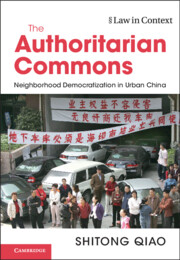Book contents
- The Authoritarian Commons
- Law in Context
- The Authoritarian Commons
- Copyright page
- Dedication
- Contents
- Figures
- Tables
- Acknowledgments
- Abbreviations
- Introduction
- Part I Theory
- 1 Defining the Authoritarian Commons
- 2 Neighborhood Democratization
- Part II A Tale of Three Cities
- Part III Benefits and Risks
- Conclusion
- Appendix I: Summary of Research Methods
- Appendix II: Survey Data and Analysis
- Notes
- Bibliography
- Index
1 - Defining the Authoritarian Commons
from Part I - Theory
Published online by Cambridge University Press: 21 December 2024
- The Authoritarian Commons
- Law in Context
- The Authoritarian Commons
- Copyright page
- Dedication
- Contents
- Figures
- Tables
- Acknowledgments
- Abbreviations
- Introduction
- Part I Theory
- 1 Defining the Authoritarian Commons
- 2 Neighborhood Democratization
- Part II A Tale of Three Cities
- Part III Benefits and Risks
- Conclusion
- Appendix I: Summary of Research Methods
- Appendix II: Survey Data and Analysis
- Notes
- Bibliography
- Index
Summary
The extant literature on the liberal commons takes as granted secure property rights, freedom of association, and the rule of law, all of which have been the exception rather than the rule throughout human history, and therefore fails to explore the origin of the liberal commons (from an illiberal regime). Authoritarianism poses a fundamental challenge to, but also an opportunity to explore the origin of, the liberal commons. This chapter defines the authoritarian commons by examining the tension between authoritarianism and the liberal commons both theoretically and in the specific context of neighborhood governance in urban China.
Keywords
- Type
- Chapter
- Information
- The Authoritarian CommonsNeighborhood Democratization in Urban China, pp. 7 - 11Publisher: Cambridge University PressPrint publication year: 2025

